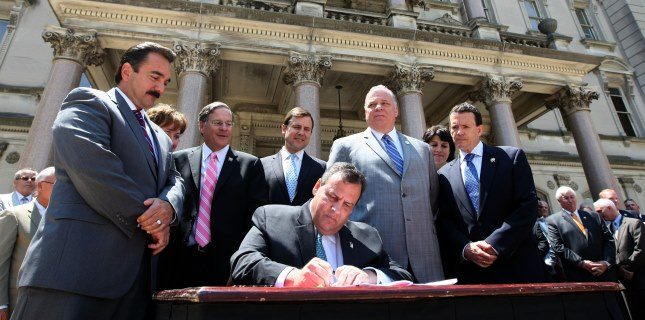
Governor Christie Signs Bipartisan Interest Arbitration Reform To Continue Controlling Property Taxes
On Jun 24, 2014Governor Chris Christie today signed into law bipartisan legislation to extend a critical property tax reform that has been instrumental in the fight to lower costs and control property taxes for New Jersey families. The legislation will continue to provide municipalities with the tools they need to keep property taxes down for by placing an interest arbitration cap on police and fire contracts. In the three years since the reform took effect, the average increase in police salaries was just 1.86 percent, the smallest bump in two decades.
This bipartisan compromise will extend the two percent cap on base salary increases in arbitration awards from the current expiration date of April 1, 2014 to December 31, 2017 and be retroactive to April 2, 2014. The bipartisan interest arbitration cap was first enacted in 2010 and sunset earlier this year.
“Today we are once again delivering meaningful and substantive reform to curb property taxes for all New Jerseyans,” said Governor Chris Christie. “Working with the Assembly Speaker and Senate President, we were able to demonstrate the power of bipartisan compromise to extend a long-term solution to the interest arbitration process and help local governments keep property taxes down and costs under control. This reform has already showed that it works to protect taxpaying families, who faced year after year of skyrocketing property taxes before we came into office and brought historic reforms and the lowest level of property tax increases in over two decades.”
Under the bipartisan reforms championed by Governor Christie, including Cap 2.0 and the arbitration cap, property tax growth has been slowed to its lowest level in two decades, with statewide increases of 1.4 percent and 1.7 percent in 2012 and 2013, respectively.
“This law was put in place to help working families deal with the problem of ever increasing property taxes,” said Senate President Steve Sweeney. “It is meant to give them a fair shake in the process and is an example of the kind of positive impact government can have when both sides come together to find common ground. While local officials will still have to make the tough decisions that put their taxpayers first, this law will help with those decisions.”
“This is the right thing for our taxpayers and the police and firefighters who do so much to protect our safety, and I thank the governor for compromising with us,” said Assembly Speaker Vincent Prieto. “I’ve said all along that taxpayers deserved this protection, but we also had to recognize that police and firefighters put their lives on the line each and every day. They deserved a bit more consideration and this law gives it to them, while ensuring taxpayers get the help they need. This is ends up being a win for everyone.”
The bipartisan compromise will allow:
- Arbitration awards to be compounded for each year of the contract;
- The time frame during which an arbitrator must render a decision would be increased from 45 days to 90 calendar days;
- The allowable time frame during which a notice of appeal of an arbitrators decision must be filed would be increased from seven days to 14 calendar days;
- The time frame allowed for the Public Employees Relations Commission (PERC) to render a decision in an appeal would be increased from 30 days to 60 calendar days;
- The maximum amount that an arbitrator could be compensated for their services would increase from “shall not exceed $7,500” to “shall not exceed $10,000”;
- An arbitrator would be required to conduct an initial meeting with the parties as a mediation in an effort to effect a voluntary resolution of the impasse. If this does not produce an agreement, then the arbitration would continue;
- The Police and Fire Interest Arbitration Impact Task Force would be continued with a final report on or before December 31, 2017;
- The “one and done” provision of the prior law is eliminated.






